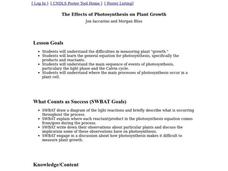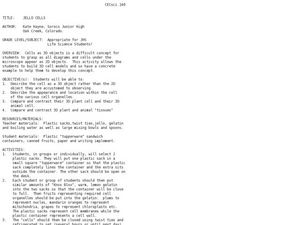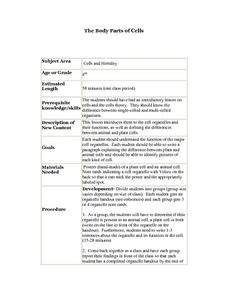Lincoln Public Schools
Cell Exploration Activities
Engage young biologists in exploring the mysteries of life with this collection of hands-on activities. Enlisting the help of numerous digital resources, students get an up-close look at the structure of plant and animal cells as they...
The Science Spot
Cells & Organelles
Familiarize young biologists with the inner workings of eukaryotic cells with this vocabulary instructional activity. By cutting out and matching a series of definitions and memorization tips to the organelles listed in the provided...
Gallantsbiocorner.com
Cell Organelles
Young scientists take a trip into the microscopic world of cellular biology with this practice exercise. Given pictures of different organelles, students must correctly identify specific parts of each cellular structure to demonstrate...
Curated OER
Cell City Project - You are the Designer!
How can something as large as a city and as small as a cell have anything in common? That is exactly the question young scientists explore with this engaging life science project. Choosing to focus on a city, school, factory, or other...
Curated OER
The Effects of Photosynthesis on Plant Growth
High schoolers are able to draw a diagram of the light reactions and briefly describe what is occurring throughout the process. They are able to explain where each reactant/product in the photosynthesis equation comes from/goes during...
Curated OER
Cells: A First-Hand View
In the first of two activities, your charges prepare wet mount slides of cork and bean sprout cells in imitation of Robert Hooke's historical investigation. An excerpt from his notes is included. Then, investigators compare animal cells...
Curated OER
AP: Chapter 35: Plant Structure and Growth
A straightforward activity has botanists list plant organs and functions, plant cell organelles and their functions, specialized plant tissues and their functions. Three high-quality diagrams are displayed for them to label as well. This...
Curated OER
Cells and Chemical Changes
The billions of cells that make up all living things are the focus of this resource. Understanding the differences between the cells that make up plants and animals is an important distinction; it is covered here quite-well. Some...
Curated OER
The Microscope and Cell
For this science worksheet, students calculate the size of different samples using the microscope as part of a formal lab assignment.
Curated OER
Animal and Plant Cell Journaling Activity
Jump into the classification of animal and plants cells, through this inviting lesson plan comparing Elodea leaves and Epithelial cells. Middle school learners will create wet mounts, write journal entries that compare specimens, and...
Biology Junction
Photosynthesis Crossword
In this photosynthesis worksheet, pupils complete a crossword puzzle with 26 questions on the processes involved in photosynthesis.
Biology Junction
Plant Cell Coloring Worksheet
In this plant worksheet, pupils define each part of the plant cell. They color and label the cell drawing and then compare and contrast plant and animal cells.
Cmassengale
Photosynthesis Diagrams Worksheet
Help young botanists get to the root of photosynthesis with this series of worksheets. By completing these diagrams, learners demonstrate their understanding of the biological structures and chemical reactions that make this amazing...
Curated OER
3-D Cell Model
Life science laureates choose a plant or animal cell to construct a model of as an at-home project. This handout provides guidelines, suggested materials, and a grading rubric for their reference. A full-page letter to parents is also...
Curated OER
Cross-Section of a Plant Cell
A one-page worksheet displays a large diagram of the organelles within a plant cell. There are 10 structures to label and a line to write the name of each. There unfortunately are a lot of little dots that you might want to white-out...
Curated OER
Plant and Animal Cells
Students investigate parts of a cell. In this plant cell instructional activity, students determine the difference between plant and animal cells. Students discover that coral is an animal based on cell characteristics. Students create...
Curated OER
Plant and Animal Cells: Alike and Different?
Seventh graders create a mneumonic device and a graphic organizer about the parts of plant and animal cells. In this biology lesson students are introduced to the parts of the cells and then work in groups to create projects that teach...
Curated OER
Bread Cells
Fifth graders examine plant and animal cells. In this plant and animal cell lesson, 5th graders define what cells are, label their parts, and describe how plant and animal cells are different. They observe cells at a number of web sites,...
Curated OER
Grade 8 Science written test
In this science worksheet, 8th graders complete multiple choice questions on plant and animal cells, organisms, planets, and more. Students complete 70 questions.
Curated OER
Jello Cells
Students create a three dimensional model of a cell. In this cellular structure lesson, students use gelatin, plastic bags, plastic containers, and fruit to construct a model of a cell. They compare the cells structures and stack them to...
Curated OER
Cell Structure and Function
In this cell worksheet, students chart the function of various cell structures. Students list the organization of a multicellular organism and illustrate plant and animal cells.
Curated OER
The Virtual Electron Microscope
Young scholars explore the world of the very small using a Flash plug-in Virtual Electron Microscope. They complete and discuss an activity in which unknown samples are placed under the computer simulated microscope to determine where...
Curated OER
The Body Part of Cells
Eighth graders are introduced to cell organelles and their functions and the they define the differences between animal and plant cells. They write a paragraph explaining the difference between plant and animal cells and students...
Curated OER
The Cell as a System
Middle schoolers review cell structures and investigate how the components of a cell operate as a system. They compare a plant and animal cell and then make a model of a cell. Students begin to understand the cell as a system by...

























